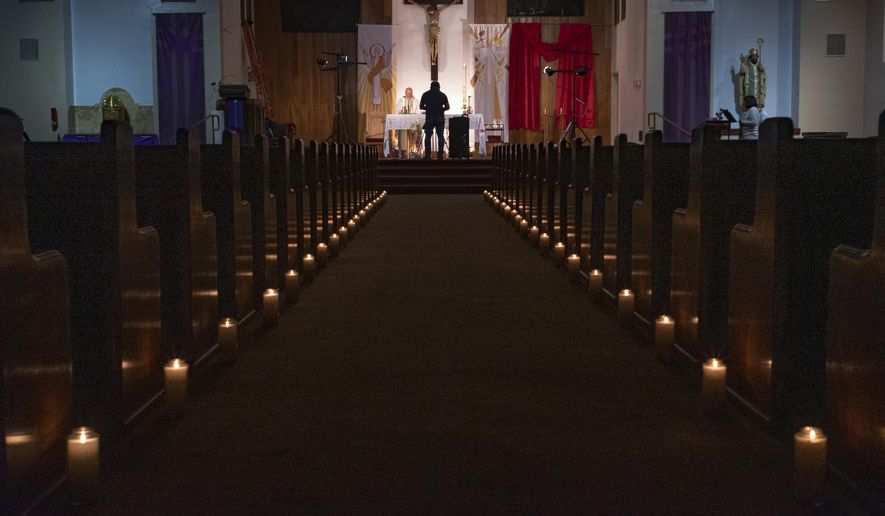A significant split has emerged in President Trump’s religious electorate, with White evangelical voters backing the president amid growing dissatisfaction from Catholic and mainline Protestant voters, according to two new national surveys.
On Monday, the Brookings Institution and the Public Religion Research Institute’s (PRRI) annual survey of American values found 46% of White mainline Protestants and 41% of White Catholics approved of Mr. Trump, a dramatic decline from his standing with those two groups in 2016.
In addition, the Catholic media network EWTN and RealClearOpinion.com on Monday reported a sizable drop in approval of Mr. Trump among Catholic voters compared to 2016, from 48% to 40%.
Mr. Trump has maintained large swaths of support from White evangelicals, with nearly 8 in 10 supporting his reelection, according to 2016 exit polling. This group has comprised the bulk of the Republican president’s “White Christian base,” but pollsters now are seeing cracks in the foundation.
“Daylight is emerging between these groups,” Robert P. Jones, CEO of PRRI, said Monday in announcing the results.
Pollsters say two factors driving dissatisfaction with the president among Christian voters are the social unrest over the summer that followed George Floyd’s death in police custody in Minneapolis and the coronavirus, which continues to spread in the U.S.
Overall, PRRI and the Brookings Institution’s survey found just below 2 out of 3 Americans disapprove of the president’s handling of the deadly virus.
The drop in support for Mr. Trump within Catholic and non-evangelical Protestant electorate — such as Lutheran, Methodist and Presbyterian voters — is key in Midwestern and Rust Belt states where evangelicals make up a smaller share of the vote.
“Donald Trump is no longer the ingenue candidate,” said associate political science professor Andra Gillespie, director of the James Weldon Johnson Institute for the Study of Race and Difference at Emory University. “Trump’s moral behavior is implicated in this.”
According to PRRI’s survey, which is based on more than 2,500 interviews, nearly 7 in 10 White evangelicals are willing to accept a presidential candidate with moral failings, compared to just 3 in 10 White evangelicals nearly a decade ago. Ms. Gillespie noted that while evangelicals are standing by the president, more moderate religious voters are less inclined to follow suit.
The president’s challenger, Joseph R. Biden, a practicing Catholic, has chipped away further into the religious vote than his predecessor on the Democratic ticket, Hillary Clinton. In 2016, 37% of mainline Protestants said they voted for Mrs. Clinton; today 48% say they plan to vote for Mr. Biden.
Mr. Biden has faced open criticism from some Catholic clergy and has vowed to do away with the Hyde Amendment, which bans federal dollars from being spent on abortion — a key concern among Catholics. But the former vice president scores much higher with Catholic voters than Mrs. Clinton, due in part to speaking openly about his faith.
“John Kerry was Catholic, but he didn’t talk about it a lot,” said Carl M. Cannon, Washington bureau chief of Real Clear Politics. “Joe Biden is Catholic, and the people know it.”
Mr. Cannon said research — not exit polls — suggests that Mrs. Clinton narrowly won the Catholic vote by 3 percentage points in 2016. However, the 12-point gap Mr. Trump now faces could be detrimental to his reelection.
“I do not think that the president can win by spotting the Democrats 12% of the Catholic vote,” Mr. Cannon said Monday in a press call.
• Christopher Vondracek can be reached at cvondracek@washingtontimes.com.




Please read our comment policy before commenting.